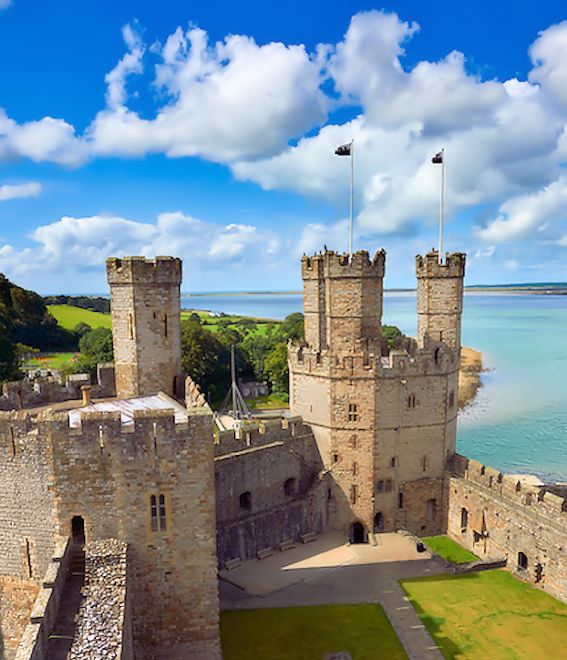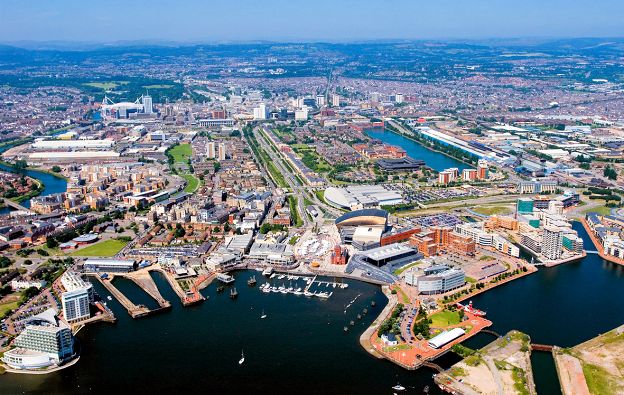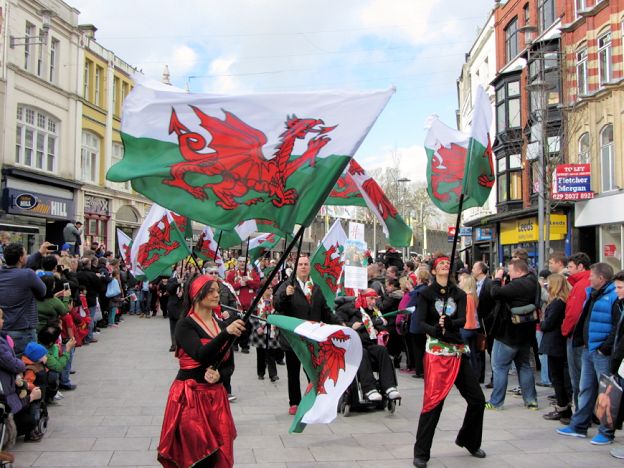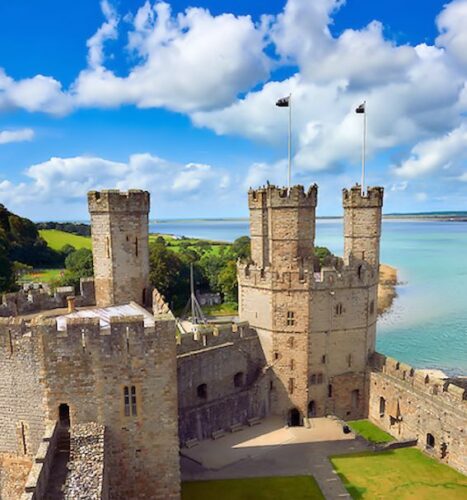
Wales history and old customs. A summary of its main events, old customs, traditions, holidays, celebrations, sports, language and literature.
Others, who have not, as a rule, gone the length of visiting the persons they condemn, call the Welshmen thieving, lying, religious, and rebellious knaves.
Edward Thomas (1878 – 1917)
British poet, biographer, and critic.
It was one of those places where the spirit of aboriginal England still lingers, the old savage England, whose last blood flows still in a few Englishmen, Welshmen, Cornishmen.
D. H. Lawrence (1885 – 1930)
British writer.
The thing I value about Wales and Welsh background is that it has always been a genuinely more classless society than many people present England as being.
Geoffrey Howe (British politician)
If you want to see Wales, Measure the long isosceles Of Snowdon with your feet.
Raymond Garlick (British poet)
Princess Diana (1961-1997), Princess of Wales from 1981 to 1997. Diana was born Diana Frances Spencer in Sandringham, Norfolk, England. Her father, Edward Spencer, was heir to an earldom, and her mother was the daughter of the 4th Baron Fermoy. Diana was educated at Riddlesworth Hall, a preparatory school in Norfolk, and later at the West Heath School in Kent. She attended finishing school in Switzerland at Chateaux d’Oex at Montreux.
Between 1062 and 1064 Harold Godwinson (later Harold II) overran Wales with an English army after a struggle with Gruffydd ap Llewellyn, king of Gwynedd. William I, the Conqueror, forced recognition of his sovereignty from the Welsh princes, but they raided the English border, for protection of which the early Norman kings erected a number of feudal lordships with very extensive powers, the so-called lords of the marches. The marcher lords were a turbulent class and a source of trouble to the kings, but they served their purpose in holding the Welsh back. In 1136 the Welsh won a victory over Henry I, King of England, but were again reduced to homage by Henry II.
Llewellyn ap Gruffydd, Prince of North Wales, sided with Simon de Montfort against Henry III, but later submitted to the king. In 1273, however, he refused to pay homage to the new English king, Edward I, who in 1276 invaded Wales and compelled Llewellyn to submit to humiliating terms, including the surrender of the eastern portion of his lands and the annual acknowledgment of fealty. Llewellyn rebelled in 1282, but died, and his brother David ap Gruffydd, who carried on the struggle, was captured in 1283 and beheaded. In 1284 Edward I completed the conquest of Wales and, by the terms of the Statute of Rhuddlan, it became an English principality.

In 1301 Edward I conferred on his oldest surviving son, later King Edward II, who was born in Caernarfon (Caernarvon), Wales, the title of Prince of Wales. This sufficiently satisfied the pride of the Welsh to keep them loyal for 100 years. It has become traditional for the firstborn son of each monarch to be given the title of Prince of Wales. The national spirit survived, however, and was nourished by the songs of the bards. When Henry IV seized the English throne, a revolt began in Wales, which, under the leadership of Owen Glendower in 1402, became formidable.
Henry IV repeatedly invaded the country, but the revolt was not suppressed until the death of Glendower, about 1416. Glendower’s was the last national uprising. The Welsh submitted to Henry VII, the first Tudor king, whom they regarded as their countryman. Tudor policy toward Wales stressed assimilation and equality. By the Act of Union of 1536 Wales was incorporated with England, its inhabitants receiving all the rights and privileges of English subjects. Welsh representatives then took their seats in the English Parliament, and customary Welsh laws that differed with those of England were abolished. The Welsh gentry continued to exercise local authority in the name of the monarch, from whom they held their lands.
In time, however, the anglicization of the gentry created a breach in Welsh society that was further deepened by religious differences. Slow to adopt Protestantism, the Welsh people were decidedly cool to Oliver Cromwell’s Puritanism and had to be persuaded by force. In the 18th century they began to lean heavily toward Calvinism, and the growth of the Calvinistic Methodist Church was an assertion of Welsh nationalism; it culminated in 1920 in the disestablishment of the English church in Wales. This coincided with party politics, for the Welsh voted overwhelmingly for the Liberal Party, which supported disestablishment. Wales in turn supplied the party with one of its most forceful leaders, David Lloyd George.
Welsh nationalism has been kept alive up to the present by the Plaid Cymru Party (founded in 1925), which has at times elected members to the British Parliament and otherwise kept pressure on the major parties to protect the special interests of Wales. In 1979 a Labour Party plan to devolve some powers to an elected assembly in Wales was voted down by the Welsh people by a margin of four to one. The Conservative Party that was elected later that year dropped any further plans for a Welsh government.
In 1997 the Labour Party came into power supporting the idea of devolving some of Parliament’s powers to national legislatures in Scotland and Wales. In a referendum held in September 1997 barely more than half of Welsh voters supported the creation of a Welsh assembly, with 50.3 percent for and 49.7 percent against. Elections were held in early May 1999, and the Welsh assembly convened later that month in Cardiff.

Somewhat isolated by a rugged, mountainous terrain, the Welsh have retained more of the culture of their Celtic forebears than have either the Scots or the English. A strong feeling of national solidarity exists in Wales, and a nationalist revival has received some political support, to the point that representatives of the Welsh Nationalist Party serve in the House of Commons in London.
Customs of Wales
“Custom, then, is the great guide of human life,” wrote Scottish philosopher David Hume. Knowing the customs of a place is, in effect, a guide to understanding the soul of that place and its people. The following Sidebar is intended to provide a glimpse into the unique world of the customs of Wales: how people marry, how families celebrate holidays and other occasions, what people eat, how they socialize and have fun.
open sidebar
The Welsh are well known for their love of singing, and their hymns and folk songs are widely known throughout the world. Music plays a large part in the annual festival, the Royal National Eisteddfod, at which poetry reading and Welsh folk arts are also featured. The Eisteddfod is held each year in a different locality, and Welsh natives and those of Welsh descent from all over the world attend. The International Music Eisteddfod is also held annually in Llangollen.
Principal libraries include the National Library of Wales in Aberystwyth, and the Library of the National Museum of Wales in Cardiff. Some major museums are the National Museum in Cardiff, the Museum of Welsh Antiquities of the University College of North Wales in Bangor, and the Welsh Folk Museum in Saint Fagans. Notable performing companies are the Welsh National Opera Company and the Welsh Theatre Company.
“Custom, then, is the great guide of human life,” wrote Scottish philosopher David Hume. Knowing the customs of a place is, in effect, a guide to understanding the soul of that place and its people. The following Sidebar is intended to provide a glimpse into the unique world of the customs of Wales: how people marry, how families celebrate holidays and other occasions, what people eat, how they socialize and have fun.
In the past, a young man would signal his interest in a woman by carving a ‘love spoon’ for her, in anticipation of courtship. Today these elaborate love spoons are found in craft shops throughout Wales. Marriage is legal at 16, but most people marry in their mid-20s. Many young people live together before or instead of getting married.

Traditionally, Welsh families have been close, with many of the extended family living nearby and grandparents sometimes living in the same house. The nominal head of the household is the father, but the mother plays an equally important role in family affairs. Many women now work outside the home. Single-parent families are becoming more common, and divorce is increasing. More than two-thirds of houses are owner-occupied, higher than in England, Northern Ireland, or Scotland.
Welsh lamb – served with mint sauce – and salmon are famous, and there are some traditional Welsh dishes such as cawl (a soup made with vegetables, particularly leeks), bara lawr (bread made from seaweed and oatmeal), and bara brith (currant cake). However, the Welsh mainly eat a variety of foods common throughout the world. In recent years there has been an increase in health consciousness with regard to diet.
Most people eat cereal, toast and marmalade, and tea or coffee for breakfast. The midday meal is usually called dinner, sometimes lunch. The main meal, often consisting of meat or fish with vegetables, might be in the middle of the day or in the evening. On Sundays dinner is traditionally served in the middle of the day, and it often includes roasted lamb with mint sauce and vegetables. The evening meal is called supper, tea, or sometimes dinner. Tea can also refer to the traditional ritual of taking tea, cakes, and scones at around 4 pm. Table manners are similar to those in other parts of the United Kingdom.
A firm handshake is usual when first being introduced, but is often dispensed with thereafter, unless one has not seen the person for some time. When meeting for the first time, a common greeting is “How d’you do?” or “Pleased to meet you.” On other occasions, “How are you?” may be used. Good friends, especially young people, use “Hello” and “Hi” to greet each other. Women who are close friends may kiss each other once lightly on the cheek; sometimes men also kiss women this way. Many women remain seated when being introduced and shaking hands. First names are widely used.
The Welsh enjoy visiting friends and neighbors, and often call without an invitation. If invited for a meal, however, it is considered impolite to arrive late.
Workingmen’s clubs are an important social base in many communities, and pubs (public houses, which serve alcoholic drinks and often food) are also popular places for relaxation. Full membership in workingmen’s clubs is restricted to men; women can be associate members.
The national sport is Rugby Union, known as “football,” and international matches played at Cardiff’s National Stadium -known colloquially as Cardiff Arms Park – are high points of the sports calendar. Soccer and cricket are also played, and people enjoy a range of sports from walking and sailing to darts, lawn bowling, and fishing.

Watching television is one of the main recreational activities. There are cinemas and arts centers in most large towns. The Royal National Eisteddfod (an arts festival and social gathering) is held every year during the first week of August, alternately in the north and south of Wales. The festival is conducted in Welsh. The International Eisteddfod takes place in Llangollen in July. There is also an annual, week-long Eisteddfod for young people. There is a strong Welsh tradition of singing, both formally in choirs and informally on such occasions as rugby matches.
Wales has the same national holidays as England, including New Year’s Day (1 January), Easter (Good Friday through Easter Monday), May Day (first Monday in May), the spring and summer bank holidays, Christmas Day (25 December), and Boxing Day (26 December). Boxing Day comes from the old British tradition by which servants and tradespeople went around on the day after Christmas to collect tips and bonuses in small earthenware boxes. It is now a day for relaxing and visiting friends.
Saint David’s Day (1 March), which celebrates the nation’s patron saint, is not an official holiday but is a day of special dinners and other events. On Saint David’s Day, people wear a leek or daffodil, which together form the national emblem, on their clothing. In 1959 Queen Elizabeth II gave Wales its official flag – a red dragon passant on a green and white background – and this is now widely displayed with pride.
The media in Wales provide services in both English and Welsh, and play a role in modern Welsh countryside
Welsh culture. BBC Wales began broadcasting in 1923 have helped to promote a form of standardised spoken Welsh, and historians have argued that the concept of Wales as a single national entity owes much to modern broadcasting. The national broadcasters are based in the capital, Cardiff. A Welsh-language television channel, S4C (Sianel Pedwar Cymru, or Channel Four Wales), began broadcasting in 1982 after a long campaign against the homogenizing tendencies of English-language television. The Western Mail is the national newspaper for Wales, although Liverpool’s Daily Post also has a significant readership. In addition to a lively periodical press, there are several other regional and local newspapers and dozens of Welsh-language papurau bro (“community papers”) produced by volunteers.

Welsh, called Cymraeg or Cymric (from Cymru,”Wales”) by its speakers, is the native language of Wales and the most flourishing of the Celtic languages. It is spoken in Wales (where the majority of its users also speak English) and in some communities in the United States and Argentina. Organizations such as the Society for the Welsh Language have saved the language from dying out and are working to assure its official status along with English. Several schools in Wales now use Welsh as the medium of instruction, and television and radio broadcasts are made in the language.
Like Breton, Welsh has discarded case endings for nouns; verbs, however, are elaborately inflected. The alternation of consonants, called mutation, plays a role, as in all Celtic languages. Welsh spelling is phonemic, representing unambiguously the pertinent sounds. In most cases Welsh speakers will know how to pronounce a word they have never seen before. Scholars recognize three periods of Welsh: Old (800-1100), Middle (1100-1500), and Modern (from 1500). Old Welsh survives only in isolated words and names, plus a few lines of verse. Welsh has borrowed words throughout all these periods from Latin, Anglo-Saxon, Norman French, and extensively from English, but it still has a large native vocabulary of Celtic origin. Forty dialects have been identified in Wales. Standard Welsh has both a Northern and Southern variety.
Find out more reading the following articles:

